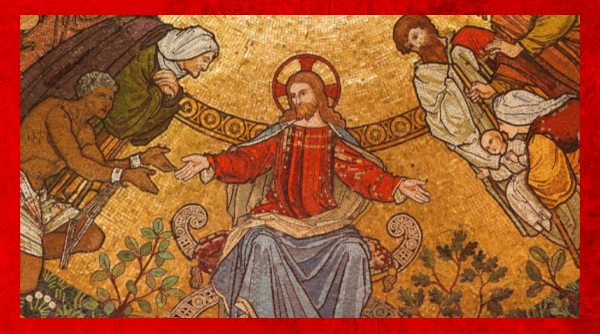Honesty and discernment

“Peter shared his remembrances with Mark and was crucified in Rome. … Philip was crucified with his head downward in Hierapolis in eastern Turkey … Simon the Zealot … preached in Egypt and Persia where he was sawed to pieces. Thaddeus … was axed to death in Syria. Thomas … was speared to death at Calamene in India. Only Judas killed himself, never having left Jerusalem. The point is that these men did not live superficial lives. … They did not leave their homes and families and their businesses just to follow a theory” (Fr. George Rutler, The Indwelling of Christ)
In Ignatius’ spiritual exercises, major choices in life are prayerfully considered after first having experienced God’s love and benefitted from one’s own purgation. The person has begun to develop a habit of prayer with God in which they question their own motives behind choices and discern whose ‘voice’ is producing their thoughts. While this refers to major life decisions such as a vocation, career, or ministry, it can also be a practice, a habit to take on for daily growth in God.
Let’s say I have this burning desire to be a missionary to the poorest of the poor in Africa. When I see their plight on the news or online, I want to act right away. So by the circumstance of that and my emotional response, I assume it means I am called to be a missionary. But is this God’s will or just an ideal, a theory, to which I am attracted?
Let’s assume I am unencumbered and free for travel: I’m over 18, not married, not in military service, not a priest or religious. The first step is to acquire indifference. Ignatius explains how a disordered way of making a choice is to choose that which satisfies us, ‘resonates’, or makes sense. Then we consider how God can be served by it. As such, we expect God to support our disordered desires underlying that choice (sp. ex. 169). Instead, we must put loving and serving God as our end purpose and set aside inordinate attachments (172-174).
Everyone must keep in mind that in all that concerns the spiritual life, his progress will be in proportion to his surrender of self-love and of his own will and interests. (189)
But true indifference isn’t something I can master myself. First, I must desire it–our disordered desires and hidden motives can make this difficult… a true desire means to give up control, so this desire isn’t automatic. I must ask for true indifference. It is something I must know in my mind and cooperate with the Holy Spirit for Him to move it into my heart. And to do that, I need a mini-purgation of sorts. In prayer, I need to unravel the pieces of this ‘desire’ to be a missionary. Why am I incited to it? Perhaps I don’t like knowing that the poor are neglected by wealthy and powerful people in their midst who could help, and I want to help correct this injustice. Maybe I was raised with financial comfort but was hurt by comments and behavior of others who were callous to the poor. Or the opposite—maybe I was raised in a family that struggled financially and I was the object of that callousness from the ‘rich’. Perhaps part of me is angry or hurt that God would permit such poverty in those countries. And just maybe I’m hurt that God permitted such callousness, poverty of spirit, in my life too.
After that honest opening of the heart to God, healing takes place and in this newfound peace, I can see that what I thought was inspired was really just my emotions driven by my own attitude toward the poor (and the rich). I realize I wanted to do what I thought were good things for God rather than doing God’s will. God permitted me to indulge my own attitude precisely for this reason: it drove me to Him. The knowledge of God and of self, a Gift of the Holy Spirit, isn’t anything I could have gained on my own by reading blogs and political commentary on Africa. And now having true indifference in my heart, I know before I wasn’t indifferent at all. Now with a purified heart, I am ready to discern this choice in prayer with Him (175-189).
This little way of exercising the heart is what God calls us to do in the daily living too. The examen brings it to the surface as we question: why do I think that? Feel that way? React like that? What is really at the base of my attitude? The nature of those conversations with Him is relationship, and God is always right there waiting to have them. In small steps over time, these conversations purify the heart and bring our heart closer to His. We are then better prepared to talk with Him about the larger choices in life.
Silvanus of Mount Athos, a holy Orthodox monk, said: “To be truly free, it is necessary to begin to bind oneself.” Men such as these are free with the freedom of the Spirit; nothing stops them and nothing frightens them anymore. They become reformers by way of holiness, and not only by way of office. (Fr. Cantalamessa, ZENIT)
We each perform a type of missionary role simply by living in recollection of God moment-to-moment within our small footprint of the planet. Lent provided the opportunity to fine tune our lives so that, like the Apostles, we too can live with an indwelling of Christ. Now basking in the joy of the resurrection, let the Lord fine tune your heart. 😊And with renewed vigor, let us pray for Pope Francis, all clergy and religious, and the worldwide Church.
May we thank those Priests who serve the Lord so faithfully and for inspiring others to follow Jesus more closely.
We pray that Jesus will continue to bless the work they do and surround them with His love.
O God, fill our hearts with Your love today. May we praise You with joy and serve You in our brothers and sisters.
We ask this through Christ our Lord. Amen.
Ad Majorem Dei Gloriam 😊
(References taken from The Spiritual Exercises of St. Ignatius of Loyola, transl. by Fr. Elder Mullen SJ, P.J. Kennedy & Sons 1914.)
(Image by Caravaggio, Public domain, via Wikimedia Commons)

Thank you for caring and sharing appropriately...
Consecrated to the Sacred Heart of Jesus through the Immaculate Heart of Mary. Except where noted, all design, writing and images ©2024 by Debra Black and TheFaceofGraceProject.com. All Rights Reserved. No part of this website may be reproduced, distributed or transmitted in any form or by any means, including downloading, photocopying, recording, or other electronic or mechanical methods, without the prior written permission of the publisher, except in the case of brief quotations embodied in critical reviews and certain other noncommercial uses permitted by copyright law. For permission or to report violations please email: thefaceofgraceproject@gmail.com
